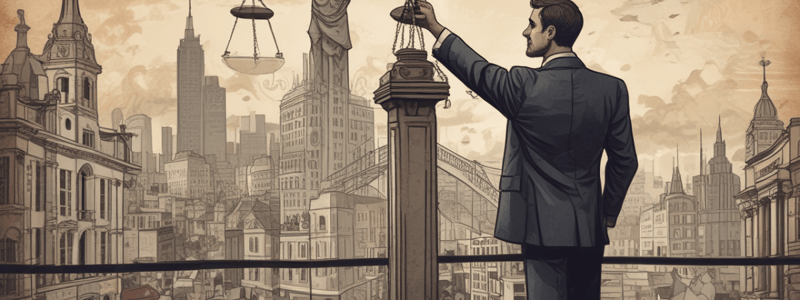Podcast
Questions and Answers
What is the central focus of the criminal justice process?
What is the central focus of the criminal justice process?
- The sentencing
- The investigation
- The appeal
- The trial (correct)
What is the primary purpose of the criminal justice process?
What is the primary purpose of the criminal justice process?
- To maintain social order
- To punish criminals
- To ensure the rights of citizens are protected (correct)
- To uphold the law
What is the basis of decision-making in the Criminal Justice System?
What is the basis of decision-making in the Criminal Justice System?
- Legislative decrees
- Personal opinions
- Moral principles
- Demonstrable facts (correct)
What is a key feature of the Criminal Justice System?
What is a key feature of the Criminal Justice System?
What is the relationship between the judicial and executive branches of government in the criminal justice process?
What is the relationship between the judicial and executive branches of government in the criminal justice process?
Why is it difficult for police officers and the public to grasp the principle of demonstrable facts?
Why is it difficult for police officers and the public to grasp the principle of demonstrable facts?
What is the lowest level of certainty required to stop a person to ask questions?
What is the lowest level of certainty required to stop a person to ask questions?
What is the term for the taking of a person into custody to answer a criminal charge?
What is the term for the taking of a person into custody to answer a criminal charge?
What is the term for the physical holding of a person or item?
What is the term for the physical holding of a person or item?
What is the purpose of a detention?
What is the purpose of a detention?
What is the highest level of certainty required to take a person into custody?
What is the highest level of certainty required to take a person into custody?
What is the term for the four basic actions that can be taken regarding the seizure of a person?
What is the term for the four basic actions that can be taken regarding the seizure of a person?
What is the term for the full or nearly full loss of freedom of movement for a set period of time?
What is the term for the full or nearly full loss of freedom of movement for a set period of time?
What is the purpose of a voluntary contact?
What is the purpose of a voluntary contact?
What is the term for the facts and circumstances that would lead a reasonable person to believe two things?
What is the term for the facts and circumstances that would lead a reasonable person to believe two things?
What is the term for the process of investigation, fact-finding, which leads to an arrest?
What is the term for the process of investigation, fact-finding, which leads to an arrest?
What percentage of certainty is often used to describe probable cause?
What percentage of certainty is often used to describe probable cause?
What is required for an officer to make an arrest?
What is required for an officer to make an arrest?
What is the purpose of an investigation in a detention situation?
What is the purpose of an investigation in a detention situation?
What is the main difference between probable cause and reasonable suspicion?
What is the main difference between probable cause and reasonable suspicion?
What protects officers from civil liability?
What protects officers from civil liability?
What is the purpose of the entire criminal justice process?
What is the purpose of the entire criminal justice process?
What is the role of the system following the decision to arrest?
What is the role of the system following the decision to arrest?
What is the level of certainty required for probable cause?
What is the level of certainty required for probable cause?
What is the purpose of an investigation?
What is the purpose of an investigation?
What is the importance of considering the believability of sources when determining probable cause?
What is the importance of considering the believability of sources when determining probable cause?
After the judge signs the warrant, what is the next step in the process?
After the judge signs the warrant, what is the next step in the process?
What is the primary purpose of an information?
What is the primary purpose of an information?
What happens if the prosecutor decides to refuse to issue an information?
What happens if the prosecutor decides to refuse to issue an information?
What is the purpose of the grand jury?
What is the purpose of the grand jury?
What happens if the prosecutor decides to take the case under advisement?
What happens if the prosecutor decides to take the case under advisement?
What is the outcome if there is not enough evidence to prosecute a case?
What is the outcome if there is not enough evidence to prosecute a case?
What is the primary goal of a democratic legal system?
What is the primary goal of a democratic legal system?
What happens when society is not of one mind regarding moral decision-making?
What happens when society is not of one mind regarding moral decision-making?
What is the danger of the police taking on the role of judge and jury?
What is the danger of the police taking on the role of judge and jury?
Why should police officers not be motivated by moral outrage?
Why should police officers not be motivated by moral outrage?
What is the main difference between a mob lynching and a police beating?
What is the main difference between a mob lynching and a police beating?
What is the key distinction between 'guilt' and 'innocence' in the legal system?
What is the key distinction between 'guilt' and 'innocence' in the legal system?
What is the role of the police officer in the criminal justice process?
What is the role of the police officer in the criminal justice process?
What is the main goal of the legal system in relation to individual rights?
What is the main goal of the legal system in relation to individual rights?
What is the primary purpose of the booking process?
What is the primary purpose of the booking process?
What happens when the public assumes that accused individuals should have no rights?
What happens when the public assumes that accused individuals should have no rights?
What is the purpose of the warrant application?
What is the purpose of the warrant application?
What is the time limit for applying for a warrant in Missouri?
What is the time limit for applying for a warrant in Missouri?
What is the relationship between morality and legality in the legal system?
What is the relationship between morality and legality in the legal system?
What is the consequence of failing to follow the 24-hour rule?
What is the consequence of failing to follow the 24-hour rule?
What is the purpose of the information document in the charging process?
What is the purpose of the information document in the charging process?
What is the role of the prosecutor's office in the charging process?
What is the role of the prosecutor's office in the charging process?
What is the significance of the 1991 Supreme Court decision?
What is the significance of the 1991 Supreme Court decision?
What is the purpose of documenting the suspect's belongings during the booking process?
What is the purpose of documenting the suspect's belongings during the booking process?
What is the relationship between the prosecutor's office and the judiciary in the charging process?
What is the relationship between the prosecutor's office and the judiciary in the charging process?
What happens to the suspect if the warrant is not issued within the 24-hour time limit?
What happens to the suspect if the warrant is not issued within the 24-hour time limit?
What is the role of the judge in the warrant application process?
What is the role of the judge in the warrant application process?
Flashcards are hidden until you start studying
Study Notes
The Criminal Justice Process
- The criminal justice process centers on the trial, but most of the process occurs prior to the trial.
- The process involves an implementation of the system of checks and balances to ensure that the judicial branch hears cases that the executive branch wishes it to, and that the judicial branch can review the actions of the executive branch.
The Role of Facts in a Democratic Legal System
- The criminal justice system operates on facts, not on what seems true or morally right.
- Demonstrable facts are required to justify any legal action.
- The legal system upholds societal norms for moral behavior, but problems arise when society is not unanimous on moral decisions or prioritizes conflicting values.
The Process
- The criminal justice process involves the following steps:
- Detention and arrest
- Booking procedure
- Application for a warrant
- Charging of the suspect (by the prosecutor or grand jury)
- Issuance of a warrant
- Arraignment
- Preliminary hearing or grand jury hearing
- Trial
Detention and Arrest
- Detention is a temporary stop to ask questions to determine if a person is involved in a crime.
- Arrest is the taking of a person into custody to answer a criminal charge.
- Probable cause is required for an arrest, which is the facts and circumstances that would lead a reasonable person to believe a crime has been committed and the person arrested committed it.
The Four "Amounts of Fact"
- Voluntary contact: stopping to talk to an officer at one's own free will
- Detention: an investigative detention to determine if a person is involved in a crime
- Arrest: a full seizure of a person to answer a criminal charge
- Conviction: the full or nearly full loss of freedom for a set period of time as punishment for a crime
Investigation
- Between detention and arrest, some investigation occurs to build probable cause.
- This may involve asking questions, checking identification, and conducting an eyewitness identification.
Booking
- Booking is a police administrative procedure to protect the suspect and department from civil liability.
- It involves collecting the suspect's belongings, establishing identity, and stating the charge for which they were arrested.
Warrant Application
- After arrest, a warrant application is made to a judge to obtain a judicial order for the arrest.
- The application is made to the prosecuting attorney's office, and a judge issues the warrant if there is probable cause.
Charging Procedure
- The charging process involves the prosecutor issuing an information document, which states the County's intent to prosecute an alleged crime.
- The grand jury may be involved in the charging process.
- The prosecutor may issue the information, refuse to issue it, take it under advisement, or send it to the grand jury.
Studying That Suits You
Use AI to generate personalized quizzes and flashcards to suit your learning preferences.




